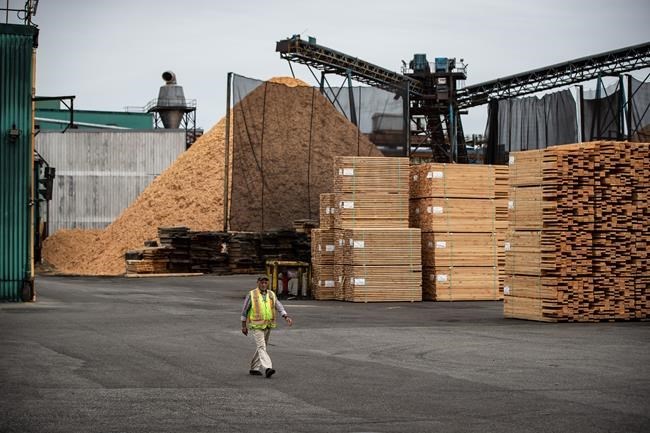WASHINGTON — Construction industry advocates, business leaders and suppliers in Canada are taking a cautious, almost sanguine approach to U.S. President Joe Biden's latest state-of-the-union salvo against the use of foreign building materials in federally funded infrastructure projects.
Two years into Biden's term, one of his most popular applause lines — "Buy American" — conjures more frown lines than full-on terror north of the border these days, a sign that a measure of stateside protectionism is now baked in to the reality of Canada-U.S. relations.
The president upped the ante modestly Tuesday, promising to extend procurement rules for federal projects beyond just iron and steel, to also include components like lumber, drywall, glass and even fibre-optic cable, as well as non-ferrous metals like copper and aluminum.
The rules allow for exemptions in cases where domestic sources can't fill the demand alone or would be too costly — which means that in practical terms, the math is on Canada's side, said Jean Simard, president and CEO of the Aluminum Association of Canada.
"Facts are facts, data is data — the U.S. produces about one-third of what it requires in terms of primary metal; they have to import," Simard said.
"Canada represents about 70 per cent of total U.S. imports. That's not going to change."
Simard and others say the political context is also important: for all intents and purposes, Biden is now on the presidential campaign trail, where he'll need the support of disenfranchised blue-collar voters in the American heartland in order to remain in the White House past 2024.
Still, the rhetoric is jarring, coming as it does just a month after Biden and Prime Minister Justin Trudeau schmoozed at the North American Leaders' Summit in Mexico City, and weeks before they'll do so again when Biden visits Canada for the first time as president in March.
"When we do these projects — and, again, I get criticized about this, but I make no excuses for it — we’re going to buy American," Biden said during the state of the union Tuesday.
"It's totally consistent with international trade rules. Buy American has been the law since 1933. But for too long, past administrations — Democrat and Republican — have fought to get around it. Not anymore."
Canada won a major victory last year when Biden's Inflation Reduction Act, which boasts generous tax credits for electric vehicles as part of a historic $389-billion climate change investment effort, included plans to favour EVs and batteries sourced and built in North America instead of just the U.S.
That change reflected a practical truth of which the Biden administration is well aware, Simard said.
"Whether one likes it or not, to deliver the dream, there will need to be a very pragmatic approach to reality," he said. "The components, the materials have to come from elsewhere, in addition to whatever is available domestically."
The B.C. Lumber Trade Council, part of an industry that is no stranger to protracted and often bitter disputes with Canada's largest trading partner, called it "concerning" that Biden wants new limits on the use of foreign lumber in projects fuelled by federal dollars.
But there, too, the simple truths of supply and demand persist, said council president Linda Coady. In 2021, the U.S. was able to produce only about 70 per cent of the lumber it needed, and Canada was there to fill the gap.
"We are seeking to better understand what this means for Canadian producers," Coady said of Biden's announcement.
"Our focus remains on working on both sides of the border to maximize the opportunity Canada has in providing the sustainably produced, low-carbon lumber products we know American homebuilders, consumers and construction workers want and need."
Both in question period Thursday and in an interview with The Canadian Press, International Trade Minister Mary Ng repeated her now-familiar vow to keep up the fight on behalf of workers, manufacturers and suppliers.
"They can count on me and the federal government to stand up for them," said Ng, noting the spirit of continental co-operation that pervaded last month's North American Leaders' Summit.
"North American competitiveness means that you're going to partner with those who, like Canada and the United States, trade together ... and where we create a competitive edge by actually working much more closely."
Canada's Building Trades Unions, the association representing more than 500,000 construction workers and tradespeople, said a critical shortage of skilled labour poses a much more dire threat to the industry in both countries.
"When we look at this issue more closely, obviously we have more alignment than disagreement between the U.S. and Canada around supply chains, trade and ultimately moving to a net-zero economy," executive director Sean Strickland said in a statement.
"We are confident that Canada and the U.S. will continue to work collaboratively on binational policies that are good for infrastructure, the environment and workers."
This report by The Canadian Press was first published Feb. 9, 2023.
— With files from Nojoud Al Mallees in Ottawa
James McCarten, The Canadian Press



